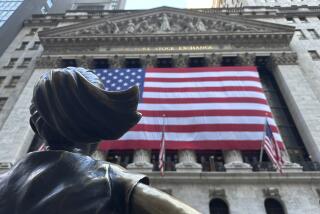Cash Promise Allows BCCI to Cling to Life
The Bank of Credit & Commerce International got new life Tuesday when its principal owner, the ruler of Abu Dhabi, promised to infuse $87 million into the troubled institution, and Britain’s High Court gave him four months to devise a restructuring plan.
The court rejected the Bank of England’s petition to permanently close the bank, which has been linked to such activities as laundering drug profits and managing accounts for Abu Nidal and other terrorists. The Bank of England and regulators in many of the other 68 countries where BCCI had done business closed the bank temporarily on July 5.
The Bank of England asserted in court that an institution as fraud-ridden as BCCI should not be given another chance. Brian Quinn, the Bank of England’s chief banking supervisor, said in an affidavit that an auditor’s report during June revealed “massive and widespread fraud going back over a number of years.”
Quinn noted that an overhaul of BCCI management had been under way when the bank was shut down earlier this month. “The fraud involved persons who were to be involved with BCCI after its proposed reconstruction,” he warned.
Vice Chancellor Sir Nicolas Browne-Wilkinson, the presiding judge, said the accounting firm of Touche Ross would guard against fraud in its role as administrator of the new cash infusion into BCCI.
The judge concluded that the bank’s depositors and employees would be better served by the offer from Sheik Zayed ibn Sultan al Nuhayan of Abu Dhabi, which held the prospect of resuscitating BCCI, than by closing the bank permanently. Zayed was given until Dec. 2 to develop a restructuring plan.
In England, closure would trigger payment of deposit insurance--75% of the first $34,000 in deposits for a maximum payment of $25,500. But depositors in England would have no hope of further compensation, Browne-Wilkinson said, and depositors in most other countries would get no insurance payments at all.
BCCI customers and employees generally welcomed the new effort to breathe life into the scandal-plagued bank.
“It’s precisely what we wanted,” said Keith Vaz, a Labor Party member of the House of Commons. It finally gives a lifeline to employees and depositors.”
“We’re overjoyed,” said Raihan Mahmud, a BCCI branch manager in London. “People have been looking only at the wrong side of the coin, the criminal activities of some of the bank’s leaders. Now they can look at the right side, at a bank that serves its Asian clients.”
However, international sources said the decision is not expected to have much practical effect.
First, BCCI has been so decimated as a result of the regulators’ crackdown that it isn’t expected to recover no matter how long a stay the court grants.
Second, the Bank of England is expected to appeal Tuesday’s decision to a higher court, which could well reverse the lower-court ruling if authorities provide additional evidence of alleged criminal behavior, as they are expected to attempt to do.
The agreement in London came fewer than 24 hours after a New York grand jury indicted BCCI, its Pakistani founder, Agha Hasan Abedi, and many of its top officers, including Swaleh Naqvi, on charges of fraud, falsifying records and theft of more than $30 million--conduct that was part of what American prosecutors described as “the world’s largest bank fraud.”
Reacting to the announcement that the United States will seek to extradite Abedi, close family friends said Pakistan has no extradition treaty with the United States. They stressed that it would not do much good for U.S. prosecutors or Abedi himself, even if the former BCCI chairman was ordered to America for trial, because of severe health problems that keep him bedridden.
Naqvi is in Abu Dhabi and it was unclear whether that Persian Gulf emirate would agree to his extradition.
In England, the new offer by Zayed was described by his attorney, David Johnson, as “putting your money where your mouth is.” It consisted of two key features:
--Abu Dhabi has put $85 million into a trust fund from which BCCI depositors in England will be paid 75% of their first $11,300 on deposit, for a maximum payment of $8,500. That is one-third of the maximum payment under the British deposit insurance scheme.
--Abu Dhabi will also pay about $2 million to compensate BCCI employees in England for 14 days of lost pay, approximately what they have lost since the July 5 shutdown.
Meanwhile, in Washington, the repercussions of the BCCI scandal continued to unfold as the House Banking Committee voted 50 to 0 to subpoena documents from the Resolution Trust Corp. In its investigation of BCCI, the committee is seeking information about CenTrust Savings, a Miami thrift that has ties to BCCI.
David Paul, the former chairman of the failed S&L;, reportedly had close ties to Saudi financier Ghaith Pharaon, a key figure in the BCCI scandal. Pharaon, according to the Federal Reserve Board, acted as a front man for the acquisition of a 25% ownership stake in CenTrust by BCCI during 1988 and 1989.
In addition, the banking panel subpoenaed RTC documents concerning the former president of Peru, Alan Garcia, who has been linked to the BCCI scandal, and his involvement with failed S&Ls.;
Times staff writers James Risen in Washington and Mark Fineman in Karachi, Pakistan, contributed to this story.
More to Read
Inside the business of entertainment
The Wide Shot brings you news, analysis and insights on everything from streaming wars to production — and what it all means for the future.
You may occasionally receive promotional content from the Los Angeles Times.






